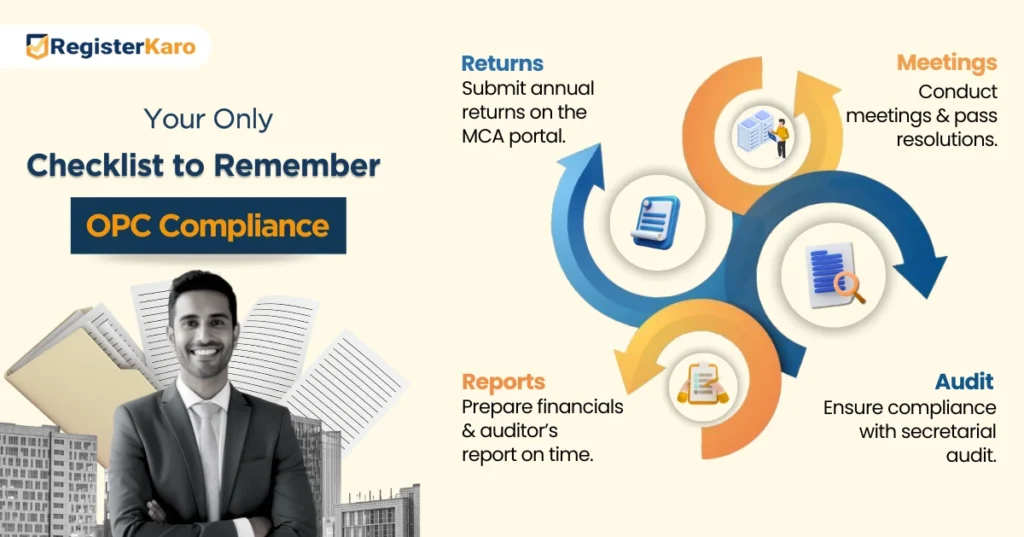
Running a business is not just about making profits, it’s also about staying legally sound. For a One Person Company (OPC), this responsibility comes in the form of annual compliance.
Annual compliance refers to the set of legal and regulatory requirements that an OPC must fulfill every year, such as:
- Filing financial statements
- Annual returns
- Maintaining statutory registers
- Completing tax-related obligations
These filings are not just formalities, they act as proof that the company is operating transparently and in accordance with the law.
In this blog, we’ll cover why annual compliance is important for OPCs, the penalties for non-compliance, and the key benefits of staying updated with mandatory requirements.
Every business stays strong not only by earning profits but also by following the law. Annual compliance ensures legal safety, credibility, and trust in the market.
For a One Person Company (OPC), formed under the Companies Act, 2013, with just one member, this becomes even more important. While OPCs enjoy limited liability and legal recognition, they must also fulfill annual compliance to maintain transparency, avoid penalties, and ensure smooth operations.
- Avoiding Penalties and Legal Issues: If an OPC does not meet its annual compliance requirements, it may face fines and legal actions against the company and its director. For example, missing the deadline to file the annual return (Form MGT-7A) or financial statement (Form AOC-4) attracts a penalty of ₹100 per day until you complete the filing. Timely compliance helps avoid such consequences.
- Mandatory Compliance from Incorporation: OPCs must be aware of and complete all required legal compliance from the time of incorporation. This includes filings, financial statements, and other statutory obligations.
- Demonstrating Transparency and Accountability: Adhering to annual compliance shows investors, shareholders, and stakeholders that the company operates in a transparent and accountable manner.
- Accurate Financial Reporting: Maintaining and submitting precise financial records ensures stakeholders have reliable information about the company’s performance and financial health.
- Building Trust and Protecting Reputation: Fulfilling compliance obligations fosters trust among investors, clients, and partners while safeguarding the company’s reputation in the business community.
- Smooth Functioning of the Company: Staying informed about applicable laws and completing obligations on time ensures the OPC can operate efficiently without disruptions.
What are the Important Compliances for an OPC?
One Person Companies in India must follow several legal and regulatory requirements to operate smoothly and avoid penalties. Meeting these compliances on time ensures transparency, accountability, and protection under the law.
| Compliance Name | Compliance Description | Associated Forms | Deadline | Penalty | Additional Notes |
| Appointment of First Auditor | Appoint a practicing Chartered Accountant as the first auditor within 30 days of incorporation. | ADT-1 (for subsequent auditors only) | Within 30 days of incorporation | Not Applicable (for first auditor) | – |
| Commencement of Business (Form INC-20A) | File a declaration for commencement of business within 180 days of OPC incorporation. | INC-20A | Within 180 days of incorporation | Company: Rs. 50,000/-; Officer: Rs. 1,000/- per day (max Rs. 1,00,000/-) | If not filed, RoC may remove the company name from the register. |
| Annual Board Meetings | Conduct at least one board meeting in each half of the calendar year, with a minimum 90-day gap between meetings. | Not Applicable | At least once a year | Company: Rs. 25,000/-; Officer: Rs. 5,000/- | Not mandatory if only one director; AGM not mandatory but recommended. |
| Annual Return (Form MGT-7A) | By September 30 of the next financial year | MGT-7A | File annual return with ROC within 60 days or 180 days after September 30 of each financial year. Includes details of shareholders and directors. | Company: Rs. 10,000/-; Officer: Rs. 50,000/-; Continuing failure: additional Rs. 100/day | – |
| Appointment of Subsequent Auditor | Appoint a new auditor using Form ADT-1 within 15 days of the first AGM. | ADT-1 | Within 15 days of concluding the first AGM | Company: Rs. 25,000–5,00,000/-; Officer: Rs. 10,000–1,00,000/- | – |
| Auditor Tenure | The appointed auditor serves until the 6th AGM. | Not Applicable | Not Applicable | Auditor rotation does not apply to OPCs | – |
| Director KYC (Form DIR-3 KYC) | Directors holding DIN must submit KYC for the financial year by September 30 of the next year. | DIR-3 KYC | By September 30 of next financial year | Rs. 5,000/- | – |
| Disclosure of Interest (Form MBP-1) | Directors must declare their interest in other entities at the first board meeting each year. | MBP-1 | First board meeting of the financial year | Director: Rs. 1,00,000/-; Up to 1 year imprisonment for non-compliance | – |
| E-form DPT-3 (Return of Deposits) | File a return detailing deposits and particulars not considered deposits as of March 31. | DPT-3 | On or before June 30 | Company: Rs. 10,000/-; Officer: Rs. 50,000/-; Continuing violation: Rs. 1,000/day | – |
| Financial Statements (Form AOC-4) | File audited financial statements electronically with the ROC within 180 days of the financial year-end. | AOC-4 | Within 180 days of the financial year-end | Company: Rs. 10,000/-; Directors: Rs. 10,000/-; Continuing failure: Rs. 100/day (max Rs. 2,00,000/- for company, Rs. 50,000/- for officer) | OPCs are exempt from full audit but require a review report. |
| Income Tax Filing | File income tax returns (ITR) annually, reporting income, expenses, and deductions. | Not Applicable | July 31 for individuals; September 30 for businesses | Rs. 10,000/- | PAN is required for filing. |
| Maintenance of Statutory Registers | Maintain registers as per Section 88, e.g., share transfers, director changes, etc. | Provisions under the Companies Act, 2013 | Ongoing | Non-maintenance may attract liabilities | Includes Register of Members, Directors, Share Certificates, etc. |
| Payment of Stamp Duty on Share Certificates | Pay stamp duty within 30 days of issuing share certificates. | Not Applicable | Within 30 days of issue | Not Specified | – |
| Statutory Audit | A Chartered Accountant conducts a review of accounts; the report is filed using AOC-4. | AOC-4 | Before filing AOC-4 | Auditor: Rs. 25,000–1,00,000/- | OPCs need a review report, not a full statutory audit. |
| TDS, GST, PF, and ESI Compliance | Comply with applicable regulations for TDS, GST, PF, and ESI based on business operations. | Applicable forms | As per the respective laws | Penalties as per the respective regulations | Depends on the OPC’s business type and employee structure. |
Which Documents Do You Need for One Person Company (OPC) Compliance in India?
For a One Person Company (OPC) in India, the following annual compliance is important to stay legal and maintain clear financial records. The following documents are essential for OPC compliance:
- Receipts of Purchases and Sales: Keep all receipts for purchases and sales during the financial year. These help verify the company’s transactions.
- Invoices of Expenses: Collect and maintain all expense invoices for the year. These track the company’s outflows and support audits and tax calculations.
- Bank Statements: Provide bank statements from April 1 to March 31 for all company accounts. These statements help reconcile accounts and check cash flow.
- Details of GST Returns: Submit all GST return details, including related sales and purchase invoices, if the OPC is registered under GST.
- Details of TDS Challans and TDS Returns: If applicable, submit details of all TDS (Tax Deducted at Source) payments and returns. This ensures tax compliance and helps claim credits.
- Financial Statements: Prepare and submit financial statements such as the balance sheet and profit & loss account. These reflect the company’s financial health for the year.
- Director’s Report: A report from the director outlining the company’s overall performance, statutory compliance, and operational details for the year.
- Details of the Member/Shareholder: Since an OPC usually has one member, maintain and submit information about the member, including shareholding details.
- Details of Directors: Keep records of the directors’ information, including their roles and activities during the year.
Collectively, these documents help ensure that the OPC operates transparently, meets statutory requirements, and maintains credibility with investors, banks, and other stakeholders.
Do you know which registrations your OPC needs after formation? Here are the important ones your company must get to stay compliant.
Every One Person Company must get a Permanent Account Number (PAN) and a Tax Deduction and Collection Account Number (TAN) from the Income Tax Department. These are necessary for filing taxes and handling financial transactions.
If your OPC’s annual turnover crosses the set limit, GST registration is compulsory. You can apply for it through the GST portal, which explains the process step by step.
In many states, you may need to register your business under the Shop and Establishment Act. This registration proves that your business premises and work conditions follow the law.
When your OPC hires employees, register for professional tax in states where it is required. The rules vary from state to state, so make sure you follow the local guidelines.
If your OPC has employees, you might also need to register under the Employees’ Provident Fund (EPF) and the Employees’ State Insurance (ESI). These registrations help provide employee benefits and social security.
Which Corporate Stationery Do You Need After OPC Registration?
After registering a One Person Company (OPC), arrange the necessary stationery items. These not only help in day-to-day operations but also ensure compliance with legal requirements.
- Name Board: Every company, including an OPC, must display its name and the registered office address on a board outside every office or business place.
- Company Rubber Stamp: It is useful to have two rubber stamps – one round stamp with the company’s name and one straight stamp with the company’s name and the designation of the authorized signatory. Use these on documents like board resolutions, bank account forms, cheques, and other legal papers.
- Letterhead: Print the company’s name and registered office address on all letterheads, invoices, notices, and other official papers.
Note: Always display the words “One Person Company” in brackets below an OPC’s name wherever it is printed, displayed, or engraved.
For a One Person Company (OPC), it is necessary to maintain certain statutory registers, a minutes book, and other secretarial records. Update these regularly to stay compliant with legal rules.
The OPC must carefully keep the following records:
- Statutory Registers: These include the Register of Members, Register of Directors, Register of Charges, and any other registers required by law. They must always be accurate and up to date.
- Minutes Book: An OPC has to maintain a minutes book to record the proceedings of board meetings, general meetings, or committee meetings. All resolutions, decisions, and discussions should be written down in order.
- Secretarial Records: The OPC must also keep copies of annual returns, resolutions passed, agreements, contracts, and other important documents. These records should be well organized and easy to access when needed.
Regular maintenance of these records is very important as it helps an OPC ensure compliance, accountability, and transparency.
What Items Should the Board Include in a One Person Company (OPC) Report?
Prepare the Board’s Report for an OPC using the standalone financial statements and present it in a simplified form. The key points to include are:
- Web Address for Annual Return: Provide the web address where the company publishes its annual return (as per Section 92(3)), if applicable.
- Number of Board Meetings: State the total number of Board meetings held during the year.
- Directors’ Responsibility Statement: Include the Directors’ Responsibility Statement under Section 134(5), confirming that the directors have properly followed financial and operational duties.
- Fraud Reporting Details: Report all fraud cases identified by auditors under Section 143(12), except those required to be reported to the Central Government.
- Explanations on Auditor’s Remarks: Provide the Board’s comments or explanations on any qualifications, reservations, adverse remarks, or disclaimers in the auditor’s report.
- State of the Company’s Affairs: Give an overview of the current condition and performance of the company.
- Financial Summary/Highlights: Include key financial figures or important highlights from the year.
- Material Changes Post Financial Year-End: Mention significant changes in the business or its operations after the financial year-end that could affect the company’s financial position.
- Changes in Directorship: Specify any new appointments or resignations of directors during the year.
- Significant Orders Affecting Future Operations: Highlight any important orders from regulators, courts, or tribunals that may impact the company’s future operations or going concern status.
What Are the Key Compliance Requirements for an OPC?
A One Person Company (OPC) must follow certain legal and regulatory obligations every year to stay compliant and operate smoothly. These requirements cover board meetings, audits, financial filings, tax compliance, and statutory record maintenance.

1. Board Meeting Requirements
As per Section 173 of the Companies Act 2013, an OPC must hold at least one Board meeting in each half of a calendar year, with at least 90 days between meetings. If the OPC has only one director, quorum rules do not apply.
Officers who fail to give notice of the Board meeting can be penalized ₹5,000, and the company may be fined ₹25,000.
Note: If there is only one director, the OPC is not required to hold Board meetings.
Under Section 139 of the Companies Act, an OPC must appoint an auditor, usually a Chartered Accountant firm, to audit its accounts and issue an audit report. Auditor rotation rules do not apply to OPCs.
OPCs must file their Annual Return using Form MGT-7 within 180 days from the end of the financial year. This return includes information about shareholders, members, and directors.
OPCs are required to file financial statements, including the Balance Sheet, Profit & Loss Account, and Director’s Report using Form AOC-4 within 180 days from the financial year-end.
Directors must declare any interest in other entities annually at the first Board meeting using Form MBP-1. Non-compliance may result in imprisonment of up to one year for directors in default.
Directors holding a Director Identification Number (DIN) must submit Form DIR-3-KYC by September 30 of the next financial year.
Form DPT-3, which reports deposits and particulars not considered as deposits as of March 31, must be filed annually by June 30.
OPCs must maintain registers and update them for events like share transfers, director appointments or resignations, changes in nominee or bank signatories, and auditor changes. Failure to file annual financial statements can lead to a daily penalty of ₹100, up to a maximum of ₹10,00,000.
OPCs must file income tax returns annually by July 31 for individuals and September 30 for businesses. Returns should include income, expenses, and deductions. Late filing can result in a penalty of ₹10,000.
OPCs registered under GST must file returns on time. Companies with annual turnover up to ₹5 crores file quarterly, while those above ₹5 crores file monthly. OPCs with turnover above ₹2 crores must also file an annual return and get their accounts audited. Timely filing helps avoid penalties and interest charges.
What Are the Timelines and Filing Requirements for OPCs?
Missing deadlines can lead to heavy penalties and legal issues. Here’s a simple checklist to help you stay on track:
Within 60 Days: Complete certain filings within 60 days of incorporation.
Annually: Every financial year, you need to file annual returns, financial statements, and the auditor’s report.
As per State Guidelines: Some registrations, like Shop and Establishment, have timelines that depend on the state rules.
Set up reminders or use automated systems to complete your OPC filings on time.
Staying compliant is crucial for a One Person Company (OPC) to operate smoothly, maintain its legal standing, and protect its reputation. Following all annual compliance requirements not only helps avoid penalties and fines but also builds trust with investors, clients, and stakeholders.
Proper compliance ensures transparency, accurate financial reporting, and accountability, which strengthens the credibility of your OPC in the business community. By planning ahead and keeping track of deadlines, OPC owners can focus on growing their business without worrying about legal or regulatory issues.
For expert guidance and support in managing all OPC compliance tasks efficiently, RegisterKaro can help you manage the process seamlessly and ensure your company stays fully compliant.
Frequently Asked Questions
OPC compliance includes all legal and statutory requirements that a One Person Company must follow every year, such as annual filings, audits, and maintaining statutory registers. It is essential to avoid penalties and ensure smooth operations.




